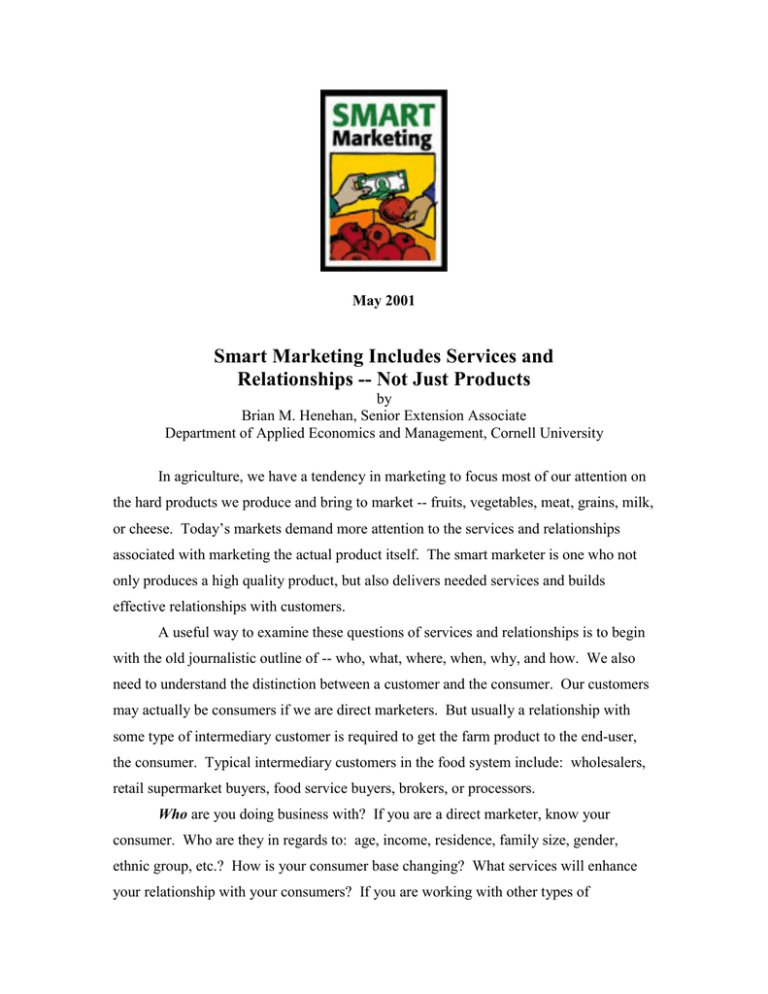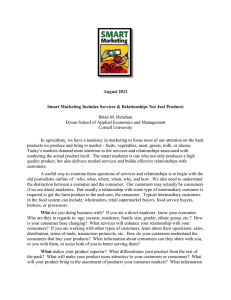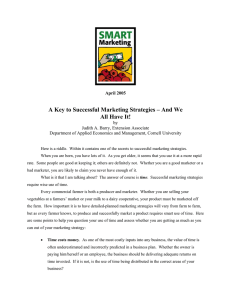Smart Marketing Includes Services and Relationships -- Not Just Products
advertisement

May 2001 Smart Marketing Includes Services and Relationships -- Not Just Products by Brian M. Henehan, Senior Extension Associate Department of Applied Economics and Management, Cornell University In agriculture, we have a tendency in marketing to focus most of our attention on the hard products we produce and bring to market -- fruits, vegetables, meat, grains, milk, or cheese. Today’s markets demand more attention to the services and relationships associated with marketing the actual product itself. The smart marketer is one who not only produces a high quality product, but also delivers needed services and builds effective relationships with customers. A useful way to examine these questions of services and relationships is to begin with the old journalistic outline of -- who, what, where, when, why, and how. We also need to understand the distinction between a customer and the consumer. Our customers may actually be consumers if we are direct marketers. But usually a relationship with some type of intermediary customer is required to get the farm product to the end-user, the consumer. Typical intermediary customers in the food system include: wholesalers, retail supermarket buyers, food service buyers, brokers, or processors. Who are you doing business with? If you are a direct marketer, know your consumer. Who are they in regards to: age, income, residence, family size, gender, ethnic group, etc.? How is your consumer base changing? What services will enhance your relationship with your consumers? If you are working with other types of customers, learn about their operations: sales, distribution, terms of trade, transaction protocols, etc. How do your customers understand the consumers that buy your products? What information about consumers can they share with you, or you with them, to assist both of you in better serving the consumer? What makes your product superior? What differentiates your product from the rest of the pack? What will make your product more attractive to your customers or consumers? What will your product bring to the assortment of products your customer markets? What information can you provide along with your product (nutritional values, recipes, portion sizes, variety, etc.) to increase sales? Where will your product have to end up to effectively serve your customers or consumers? How will your product hold up in transit? Will your product arrive in a package ready for store display or use in the kitchen? Are there any ways to make life easier for those who buy your products in regards to scheduling or delivery? Can you better coordinate shipping with other firms who are shipping similar products in your area? When does your product need to arrive? Time is of the essence for all of us. How can you cut your customer’s time spent receiving or handling your product? Are there ways to minimize the time your consumer (convenient parking, check-out) or customer (processing invoices or payment) does business with you? Just-in-time delivery and automated inventory replenishment are becoming standard business practices in both the retail and food service industries. Why should your customer do business with you in regards to the services you offer and the value you bring to the business relationship? Why should you be considered a “preferred” supplier by your customer? Why should your ability to attract consumers to your product add value to your customers business? How will you better understand what services and relationships will be needed to insure the effective marketing of your products? In a rapidly changing marketplace, those services and relationships are changing. How will your services increase the productivity and profitability of your customers? In summary, smart marketers not only deliver high quality products that are relevant to consumers, but must also provide valuable services to build effective relationships with customers. Hopefully, answering some of these questions might shed some light on how to improve your marketing capacity. In the haste to produce the hard product itself, don’t forget the needed services and relationships that will keep your product on the shelf, on the plate, or in the hands of consumers. "Smart Marketing" is a monthly marketing newsletter for extension publication in local newsletters and for use by local media. It reviews the elements critical to successful marketing in the food and agricultural industry. Articles are written by faculty members in the Department of Applied Economics and Management at Cornell University "Share the gift of communication." Please cite or acknowledge when using this material.





